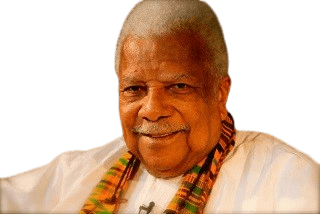Life and achievements
Early life
Born on February 24, 1933, in Mombasa, Kenya, Ali Mazrui was the son of Islamic scholars. Sheikh Al-Amin Bin Ali Mazrui's father was Kenya's Chief Islamic Judge and an Islamic Shari'ah expert. He introduced young Ali to the Mazrui. He was born in Mombasa and was thus raised in a family that spoke Swahili, Arabic, and English, all of which would later define his multilingual academic career.
His primary and secondary education was quite rigorous, and at one point, he was not admitted to Makerere University, which altered his course. However, Mazrui's academic dreams did not fade away, and he got a scholarship to study abroad.
Mazrui received his first university degree from Manchester University in 1960 with distinction, an M.A. from Columbia University in 1961, and a Ph.D. from Oxford University in 1966. He was educated in the spirit of pan-Africanism by Kwame Nkrumah and the post-colonialism. These were the ideas that Mazrui developed throughout his academic career, especially his concern for the African identity in the world, including colonial, Islamic, and African elements.
Legacy
It is fitting to reflect on Ali Mazrui's contributions to African political thought and the world of culture, identity, and power. His notion of 'Africa's triple heritage' summed up his view on the nature of African society, which he believed was a combination of indigenous, Islamic, and Western cultures. This idea, which became the centerpiece of his famous television series The Africans: A Triple Heritage, found an echo worldwide and provided a perspective on Africa's history, present, and potential that placed it at the center of the world stage.
Mazrui was an academic of his generation and held positions at some of the most prestigious institutions, including Makerere University, the University of Michigan, and Binghamton University. His work in the United States played a middleman in connecting African studies and African American scholarship, which had been challenging to combine. His writings were anti-African and anti-Western, which placed him in the middle as an intellectual who was neither from the East nor the West but commented on both.
Mazrui was not only an academic but also impacted society. He regularly participated in political debates on Africa's future and the world economy. He periodically accused the West of meddling in African affairs and continuing to plunder the continent's wealth. His ideas regarding 'Global Apartheid' and how the First World continues to oppress the Third World are still relevant.
Mazrui also contributed to the field of Islamic studies and analyzed the functions of Islam in African politics and its prospects for liberation.
Mazrui's ideas are still relevant in the discussion of African identity, post-colonialism, and the position of the Global South in world politics. This way, he made sure that his work was understandable for anyone, starting from scholars and ending with politicians. To date, Mazrui's impact is still felt through the books he authored, the television series he presented, and the many scholars he taught and inspired during his lifetime up to his death in 2014.
Milestone moments
Oct 18, 1986
The Africans: A Triple Heritage Premieres
In 1986, Ali Mazrui's nine-part television series The Africans: A Triple Heritage was broadcast on the BBC and PBS. It was a significant program that focused on Africa's cultural identity.
The series depicted three major forces that affected Africa: the indigenous culture, Islamic culture, and Western culture, and how the three have influenced the course of African history.
The Africans was very successful and caused much controversy, especially in the United States, where Mazrui was accused of being anti-Western.
However, the series succeeded and is still considered one of the most essential works in analyzing African history and culture.
This achievement reinforced Mazrui's position as one of the continent's foremost thinkers, providing a provocative worldwide account of the African experience.
Feb 14, 1976
The appearance of the book Towards a Pax Africana
Mazrui published Towards a Pax Africana in 1967, advocating for African liberation and forming African security forces to solve African conflicts.
The book was against interference in African issues by other countries and advocated for Africans to chart their course.
Towards a Pax Africana was also applauded and made Mazrui a champion of African political liberation and integration.
This was important in the discussion of African unity and the capacity of the African countries to manage their conflicts without foreign involvement.
This paper argues that Mazrui's vision of "Pax Africana" remains relevant to current discussions on Africa's role in promoting peace and conflict resolution.
Nov 20, 1979
Mazrui gives the BBC Reith Lectures
In 1979, Mazrui was invited to deliver the prestigious BBC Reith Lectures titled The African Condition. The lecture examined Africa's postcolonial challenges and its place in global politics.
The lectures provided insight into Africa's cultural diversity and its political and economic opportunities and challenges, both endogenous and exogenous.
The African Condition was well received. The book introduced Mazrui's ideas to the international community and proved that Mazrui had the potential to explain the African condition in the global arena.
This milestone made Mazrui one of the critical commentators on the development of the African continent and its place in the world.
The Reith Lectures remain an essential source of information on the African postcolonial experience.
Aug 13, 1974
Named Director of the Center for Afro-American and African Studies
Mazrui was appointed as the Director of the Center for Afro-American and African Studies (CAAS).
In his work at the institution, Mazrui focused on strengthening the link between the African continent and African Americans in the United States.
CAAS was a centre for discussing race, identity, and the African experience, with Mazrui as one of the leading voices.
This milestone was Mazrui's way of ensuring a connection between African and African American scholars to define the future of diaspora studies.
His leadership at CAAS contributed to the centre's enhancement of its position as a leading African and African American studies institution.
